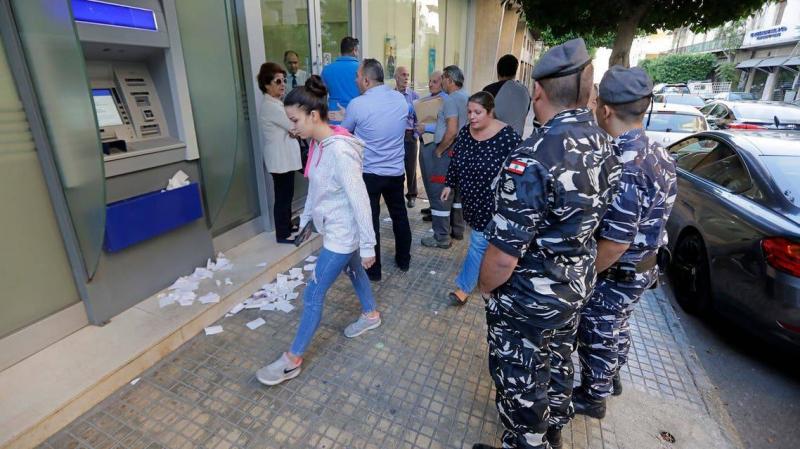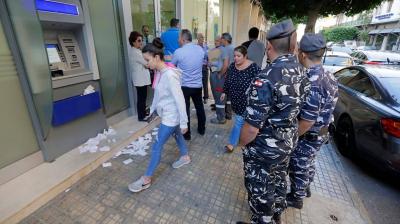The financial crisis hitting Lebanon has not only impacted Lebanese depositors, whose banks have restricted their cash withdrawals and prevented the spending of foreign currency for dollar account holders, but has also extended its repercussions to deposits and balances belonging to Yemeni banks held at Lebanese banks.
In this context, an official Yemeni delegation visited Beirut last week, marking their second trip to Lebanon to demand the return of funds belonging to Yemeni banks, estimated to be over $250 million, which flowed into their accounts until the pre-crisis period at the end of 2019. Yasser Al-Qabati, General Manager of Correspondent Bank Accounts at the Yemeni Central Bank, stated to "Al-Arabiya.net": "The funds belong to all Yemeni banks and were transferred to accounts at 'Bank of Beirut (BOB)' and designated for financing the cost of essential imports for the Yemeni market, such as wheat, flour, and medicines."
He further added that "as of now, no specific mechanism has been agreed upon for repaying the amount. However, the Yemeni delegation proposed a mechanism during a meeting a few days ago with the Lebanese Central Bank, and they informed the Governor of the Central Bank of Lebanon, Riad Salameh, that they would present the proposed mechanism to the management of 'Bank of Beirut' to retrieve the frozen funds."
Al-Qabati continued, stating: "In light of the situation Lebanon is going through, we informed Salameh about our urgent request to recover $100 million in cash to meet the external obligations of Yemeni banks. Notably, 'Bank of Beirut' released part of those deposits to some Yemeni banks following the meeting that occurred in Beirut last week with its senior management, but it remains insufficient," he said.
**Recovery of $100 Million**
Furthermore, he revealed, "The Yemeni delegation requested the recovery of $100 million as an initial payment from the estimated amount of over $250 million, with the remaining balance to be paid according to a mechanism that is agreed upon and suits the conditions of Lebanese banks, which are currently facing a severe crisis."
Al-Qabati stated, "We are well aware of the difficulties the Lebanese banking sector is experiencing, and we appreciate that. However, the funds of Yemeni banks have been frozen since before the crisis in October 2019, which has created a real crisis for Yemeni banks, and we need to recover them."
**Pressure to Recover Funds**
In response to a question about whether the Yemeni central bank and Yemeni banks would resort to legal action to recover those funds, Yasser Al-Qabati replied, "We are pressing to recover the balances while acknowledging the crisis Lebanon is facing. We are confident in the Governor of the Central Bank of Lebanon to devise solutions that align with the proposed mechanism for recovering the amount."
He also indicated that "since 2019, his country has not taken any legal action against 'Bank of Beirut' despite the significant damage inflicted on the Yemeni banking sector," expressing hope for a resolution, especially since the Lebanese Central Bank Governor had been understanding and responsive to the requests made by the Yemeni delegation during the last meeting.
It is worth noting that a Yemeni banking delegation, which included officials from the Central Bank and Yemeni banks as well as the Yemeni ambassador in Beirut, met last week with the Governor of the Lebanese Central Bank and members of the banks' association, demanding the disbursement of part of the funds in cash, with the possibility of agreeing on another mechanism for the remaining amount.
**The Amount Exists**
For its part, Lebanese banking sources merely confirmed to "Al-Arabiya.net" that "the Yemeni funds exist in Lebanese banks, and the Yemeni delegation visited Beirut days ago to negotiate how to recover them, but there is no Lebanese banking decision yet on how to disburse the amount, whether in installments or determining a specific date to start payment."
It should be noted that since the fall of 2019, Lebanon has been suffering from a drop in its currency (the lira), soaring inflation to historic levels, and a severe shortage of foreign currency, amid the political class's failure to form a government for over seven months. The World Bank warned earlier this month that Lebanon is engulfed in an economic collapse that could place it among the worst ten global crises since the mid-nineteenth century, in the absence of any horizon for a solution to alleviate the deteriorating situation exacerbated by political paralysis.




